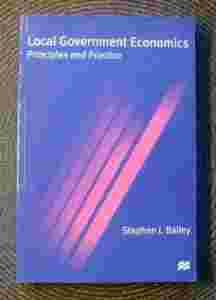|
Reviews'...written in a reader-friendly style...The concluding section should be required reading for all local-government researchers and practitioners.' - David Burningham, Times Higher Education Supplement
'Written in a user-friendly style, making full use of international data and cross-country comparisons...starting with a thorough review of the trade-off between technical efficiency and economies of scale and the exit-voice framework, he successfully navigates the reader through the economics of charging grants, expenditure and taxation to issues of local-government reform, competition and quality. The concluding section should be required reading for all local-government researchers and practitioners.' - David Burningham, Times Higher Educational Supplement
'A most interesting book that will fill an important gap in the market.' - Professor P.M. Jackson, Director, Management Centre, Leicester University
DescriptionLocal Government Economics progresses on from the author's earlier book, Public Sector Economics, addressing many of the same themes but at a more advanced level, and specifically within the context of local government. Suitable for both UK and international readerships, it reflects the multidisciplinary nature of local government and is aimed at final year and postgraduate students on economic or multidisciplinary degrees.
Author Biographies STEPHEN J. BAILEY is Professor of Public Sector Economics at Glasgow Caledonian University. He has published widely in the field of local government economics and is the author of "Public Sector Economics: Theory, Policy and Practice" (Macmillan 1995). Professor Bailey has also undertaken commissioned research for the UK government and the Council of Europe.
Contents
Introduction to Local Government Economics
The Economic Efficiency Case for Decentralised Government
Exit and Voice within Local Government
Revealing Preferences Via Exit and Voice
The Economics of Local Government Expenditure
Fiscal Stress
The Economics of Local Government Charges
The Economics of Local Government Taxation
The Economics of Intergovernmental Grants
The Median Voter Model and Hypothesis
The Flypaper Effect
Public Choice Theory and Local Government Reform
Competition and Quality
The Impact of the Purchaser-Provider Split in the UK
Conclusions
Bibliography
|

